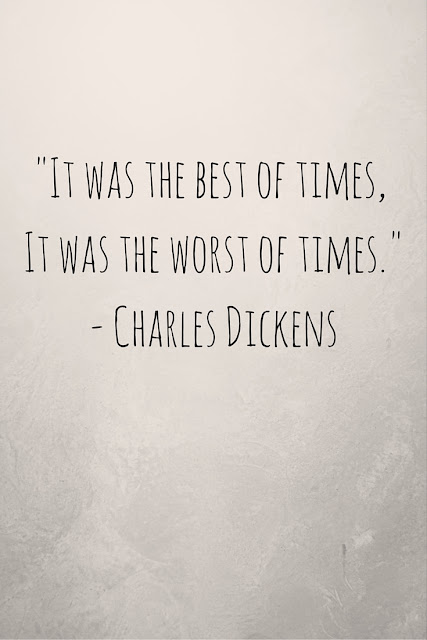Okay, okay, I know I'm being one billion percent cliched here by not only reviewing a Dickens novel, but also using this quotation. However, as they say, in for a penny, in for a pound right? I'm a big lover of 19th century fiction (in case you hadn't gathered from my blog already), and I love to come back to the genre time and time again to find something new. Despite his general misogyny, Dickens does really have a piercing insight into the world of 19th Century class division, in a way in which the likes of Austen, or, god forbid even Hardy, never reaches.
A Tale of Two Cities moves between London and Paris during the upheavals involved with the French Revolution. However, as well as telling the story through the physical cities, Dickens also examines it through the love between Lucie Manette and Charles Darnay.
Despite her French name, Lucie was brought up in London, an orphan, until she is met with the news that her father is in fact alive in Paris, and had been a prisoner in the Bastille. She heads to this other great city, retrieves her, by all means unwell, father and returns with him to London. Thereupon begins a great and tragic love story between her and Darnay. The one problem? He has a secret that encompasses both cities. A secret that Lucie's father keeps close to his chest, as he is the only one other than Charles that knows of it.
Charles was once a member of a great family, and escaped from France a few days before a law was passed sentencing all aristocratic emigrants to death upon their return to the country. He receives a letter informing him that one of his loyal servants has been captured for his misdeeds, and he is obliged to return in order to save him. From there, the little family face many trials and tribulations, and must escape a city that has struck an endless cry for blood.
I've read quite a number of Dickens' books, and here again we fall into the trap of women either being angels or demons. However, he does uphold the role they had to play in the falling of the Bastille and its aftermath; giving them some kind of political standing. As always the novel was filled with twists and turns that kept you wanting more and more. For once however, we weren't overrun with myriads of new characters, but rather were privy to a depth of character exploration often unseen in Dickens' work.
I have previously studied the French Revolution in fairly great depth, so it was truly interesting for me to see the opinions of a Londonite author about the happenings in France. According to historians, it is pretty unlikely that Dickens headed to France himself during this period, which means that the interpretation we get in the novel runs off of rumours and news stories circulating London during this period. This does not however make the novel any less interesting, as it shows the general opinion of London at this time.
Have you read A Tale of Two Cities? What did you think?


No comments:
Post a Comment